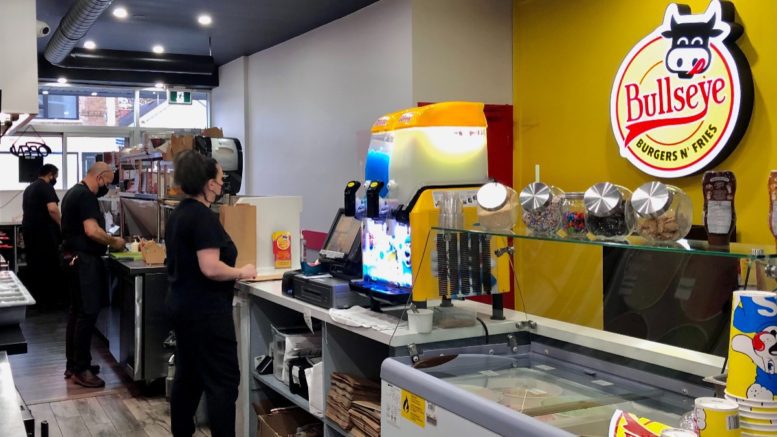COVID-19’s Reopening Ontario Act is underway as 83 per cent of the eligible population in Toronto are fully vaccinated, according to a recent news release by the City of Toronto.
On Oct. 25 the city granted several businesses, ranging from restaurants to recreational facilities, permission to operate at a larger capacity.
This week capacity limits will be lifted allowing access to indoor services with proof of vaccination and a mask covering.
Jim Tsironikos, the owner of Bullseye Burgers N’ Fries is skeptical about the new capacity limits.
“For now, we’re putting off indoor dining because of the negativity and concern around it,” Tsironikos said. “We’re lucky in a sense that a lot of our customers prefer takeout.”

Bullseye Burgers N’ Fries, located on Pape and Mortimer avenues, can seat 16 to 20 people on four sets of tables. Just over a month ago, their makeshift patios were the central attraction, according to Tsironikos.
Now, as a result of patios being in question, weather concerns, fewer dine-in visits and the discomfort of customers in providing vaccination bring uncertainty to their business.
“To put someone at the door to check for vaccine passports, it would be a huge financial burden because we’re a small-scale business,” he said.
Another aspect that concerns him about their budget is the price of meat and vegetables increasing lately.
James Rilett, Vice President of Restaurants Canada, lays out the total expenses of restaurant businesses in Toronto since capacity limits came into effect, as well as initiatives the association brought to the government’s attention.
Restaurants Canada is an organization that represents “the voice of foodservice,” for the restaurant industry, which makes up 60 per cent of small businesses.
“Lifting the capacity has allowed restaurants to maximize their potential profits in a given time frame. It’s not much more expensive to be open for a full service than it is for half service, if you’re full, your profits are a lot better,” Rilett said.
According to his research, an average restaurant allotted 30 per cent of its earnings towards food expenses. He also found a steep rise in food prices in the last year, which impacts the costs of running a restaurant by 15 per cent.
“Since vaccine passport enforcement, restaurants have faced a 30 per cent downturn in customer traffic. 20 per cent of the population was no longer eligible to go in restaurants, others didn’t want to give proof or hadn’t downloaded QR codes,” Rilett said.
The cost of full-time additional staffing is around CAD $38,000 dollars a month.
In order to maintain heated patios it’s estimated to cost about five thousand dollars a month, alongside renting the tent structure and heaters. A combination of cold weather and vaccine passports are also major factors for patio inactivity.
“We’re proposing a wholesale price for alcohol used in restaurants, cuts to the employer health tax and other government fees that could be lowered in order to support restaurants,” said Rilett.
“Prohibition against evictions has helped,” said Rilett, regarding the renewed moratorium eligible for small businesses under the Canada Emergency Rent Subsidy, which ends on April 22, 2022.
“The increase in wages that the government has announced will be hard to absorb,” Rilett said. He adds, “debt is the biggest issue right now, along with the ability to pay bills, the increasing costs associated and the ones that the government has just placed on us with higher wages, which is going to push a lot of people to the brink.”
Rilett found three in five closures of small businesses during the pandemic.
“In general tipping has been way up since dining areas have reopened. Any staff that earn tips are doing a lot better than before,” Rilett said. “Support in any way you can, by putting a kind word into your local favourite restaurant and let them know you’re supportive of them which helps they need to make the decision whether they’re going to keep going or not.”
“The more people that come in and feel comfortable, the more the sales are generated, and it keeps the economy going. But hopefully, we reach the stage where there’s full immunity, and things are back to normal,” Tsironikos said.
The province plans to restore normalcy by removing all public health restrictions by the end of March next year.

